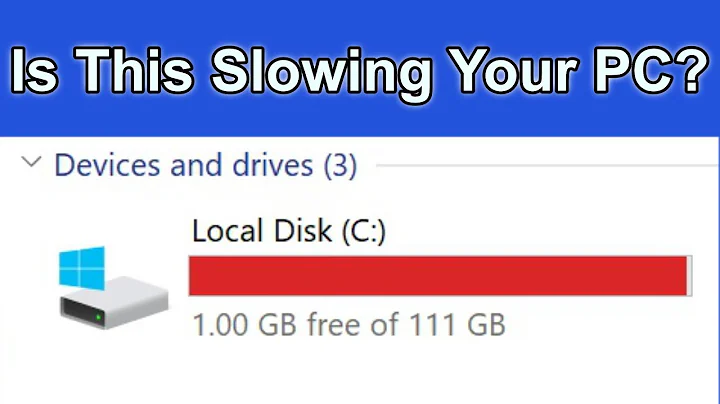How does downloading a file overnight affect the CPU and hard disk?
Solution 1
The same way it does during the day: at that rate, approximately not at all. Even at a faster rate, pretty much without adding any significant load to the system.
Solution 2
The CPU is a tough piece of silicon and due to the protection system built into recent CPUs, you can't really damages it by overheating.
There should be virtually no wear in the HDD once the head started flying. If during the night, the drive does not experience extra load/unload or spin-up/-down cycles, the extra hours of work should have little effect on its life. However spinning hard disks are sensible to heat and vibrations, if you have a poorly ventilated/dusty case, your drive may die an early death.
Solution 3
There is a study from Google: They found that load does not affect a hard-disk's lifetime in any way. It really does not matter if you torture it all day or not. http://static.googleusercontent.com/external_content/untrusted_dlcp/research.google.com/en//archive/disk_failures.pdf
The CPU though will have a shorter lifetime due to heat. Heat increases migration of particles. But downloading a file uses the CPU to a very tiny degree. Don't worry. I never do worry about stressing system components.
Solution 4
That covers the CPU, which as pointed out is one durable and amasing piece of a computer.
A hard drive allowed to sleep at night could give it 6-8 hours of bearings of the motor downtime. While it isnt great to have a hard drive spinning up and down all the time for no good reason, allowing it to spin down for half days, can extend the life of the motor bearings by that ammount of time.
If the hard drive is allowed to sleep,and would sleep, and downloading All Night long keeps it awake, then it will last less time. If it is a download or anything else "finishing up" then the drive can still go to sleep eventually.
when it comes to night vrses day , everything being a bit cooler is a good thing, and often the network is less utalised at night, so the activity is less likely to get in the way of other people in the local area.
Related videos on Youtube
Elmo
Updated on September 18, 2022Comments
-
 Elmo over 1 year
Elmo over 1 yearI am currently downloading a legal torrent of 49 files (8 GB total) and getting the speed of 50 KBps. How does doing this overnight affect the CPU and hard disk? Are there any long-term risks to the hard disk by the constant write or the CPU?
-
Thalys over 12 yearsI've had a system running 24/7 for the past 5 years, doing amongst other things downloading torrents. so far i've lost a video card and a PSU. Hard drive and CPU are fine
-
-
Paperlantern over 12 yearsAgreed. You are simply making the computer do what it was designed to do. Asking this question is like asking if driving your car to work twice in the same day will hurt it any. No, no more wear than would normally occur. The car is meant to be driven, the computer is designed to download and save data, it is one of its capabilities. Believe it or not you could leave it on for months and not hurt it one bit. Have at it.
-
Paperlantern over 12 yearsIf a CPU OVERHEATS you certainly CAN damage it. The protection simply shuts it down before significant damage should occur. Though I don know why you would mention overheating. Downloading torrents would hardly make even a pentium III breathe hard. Overheating would not be a concern in this scenario.
-
Ignacio Vazquez-Abrams over 12 yearsWell, the negative temperature coefficient of silicon (that is, its resistance decreases as it heats up, causing it to conduct more current and subsequently heat up faster) tends to make it more sensitive to heat than most other materials.
-
Synetech over 12 years> Downloading torrents would hardly make even a pentium III breathe hard. @Paperlantern, not true; it depends on several factors including the number of torrents, their contents, connection settings, disk allocation, and corruption. I have seen instances of a 1.7GHz P4 spinning at up to 100% for a while and "idling" at ~50% because of multiple torrents running with many open connections all running in parallel; the overhead can start to add up.
-
Paperlantern over 12 yearsOkay, i will rephrase. Downloading A torrent will hardly make a PIII breathe hard. I can see an instance where multiple connections on multiple torrents could make a SINGLE core machine use a little more CPU.
-
Paperlantern over 12 yearsYour post makes it sound like a hard drive has a FINITE amount of time before it up and quits. This isn't exactly true. Running one hard drive all night every night it's entire useful life may not cause it to fail, while another one would. I have a 10GB drive from over a decade ago, that is a server drive and still runs fine. It has virtually never been off. No, letting it have "down time" vs not letting it have "down time" will not have any adverse effect on a drive. If that drive has a defect that will cause it to fail anyway, then your statement could be true.
-
 Psycogeek over 12 years3 studies on hard drives now have shown that hard drives either die early, I assume being some sort of defect, then they pretty much live for a certian ammount of time and then on an average die after having been spun up for time. The drives are also MTBF based on lenght of time they are spun-up. its in the book :-) well actually my book only, the one that says I have never lost data. I am of the opposite opinion that spin-up itself is the killer, when the death studies are based mostly on non-stop drives.
Psycogeek over 12 years3 studies on hard drives now have shown that hard drives either die early, I assume being some sort of defect, then they pretty much live for a certian ammount of time and then on an average die after having been spun up for time. The drives are also MTBF based on lenght of time they are spun-up. its in the book :-) well actually my book only, the one that says I have never lost data. I am of the opposite opinion that spin-up itself is the killer, when the death studies are based mostly on non-stop drives. -
kinokijuf over 12 years@Paperlantern Unless you have buggy hardware. I have problem on my desktop that if I download too much, the wifi adapter overheats and freezes the usb port it is connected to. When I later shutdown the computer, it at the very end crashes with BUGCODE_USB_DRIVER.




